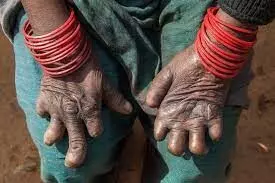- Home
- /
- Trending-News
- /
- People living with...
People living with leprosy seek urgent action to end social exclusion

People living with leprosy in the FCT have called for urgent action to end social exclusion and discrimination.
They made the call while speaking with the newsmen, on Sunday in Abuja. As Nigeria joins the global community today to mark the 2024 World Leprosy Day.
Supreme News reports that the theme for World Leprosy Day 2024 is “Beat Leprosy”. This theme encapsulates the dual objectives of the day: to eradicate the stigma associated with leprosy Epps and to promote the dignity of people affected by the disease.
Malam Musa Kabiru said the disease has made him ”social outcast”.
”I no longer recognise myself and neither does my wife.
“I suffer from what doctors call nerve damage, resulting in impairment, deformity, and disability. I have long battled hunger and discrimination. With no gainful employment or support from anyone or the government, I am now forced to beg for money. If I can get up to N200, I will be grateful for that day.
“Where I buy food, I often get leftovers because my money is not enough for a proper meal. When I am sick, no one wants to touch me to know how I am feeling, so I resort to taking alternative medicine. So far, I am alive until my creator calls me home to Him,” he narrated.
He shared that he continues to face social ostracization, leading to isolation, unemployment, and limited access to healthcare and education.
Also speaking, Ms Mairo Shehu, expressed concern that to combat social exclusion, governments and relevant agencies need to actively raise awareness and challenge negative perceptions surrounding leprosy.
”There is a pattern where organisations show support around on the World Leprosy Day, but after the celebration, the support stops.
”We need continuous efforts, such as community outreach programs and dispelling myths about leprosy, to encourage acceptance and integration of affected individuals into mainstream society’,” she said.
She said that these efforts would encourage acceptance and integration of individuals affected by leprosy into mainstream society.
Also, Mrs Doris Maigari, underscored the need for the government to take steps to ensure equal access to healthcare and education for people with leprosy.
According to Maigari, special clinics should be established, equipped with trained medical professionals providing free treatment and rehabilitation services.
“These clinics should offer counselling and psychological support to help us cope with the emotional challenges we may face.”
Furthermore, she urged the government to initiate vocational training programmes to empower the community with skills leading to sustainable employment opportunities.
“By equipping us with the necessary tools and knowledge, the government will break the cycle of social exclusion and provide a path towards self-sufficiency for us,” she said.”
For Pastor Matthew Okafor, inspite of government’s claims regarding support for individuals living with leprosy, challenges persist in the battle against social exclusion for people with the disease.
“Stigma and discrimination persist, hindering their full integration into society.
“It is crucial for the government, civil society organizations, and the general public to continue their collaborative efforts to eradicate these prejudices and ensure equal rights for all individuals, regardless of their health conditions,” he said.
However, he emphasised the need for sustained efforts to completely eradicate the social barriers faced by this marginalised community and foster a truly inclusive society.
Supreme News reports that leprosy is an ancient disease that remains endemic and continues to be a major public health problem in many tropical countries.
According to experts, leprosy is linked to underdevelopment hence its prevalence in underdeveloped countries.
Leprosy is a chronic infectious disease caused by a bacillus, Mycobacterium leprae. The germ multiplies slowly and the incubation period of the disease, on average, is five years.
Symptoms may occur within one year but can also take as long as 20 years or even more.
Transmitted through droplets from infected persons, it mainly affects the skin, the peripheral nerves, the mucosa of the upper respiratory tract, and the eyes.
The disease is curable with multidrug therapy before it progresses and causes permanent damage to the skin, nerves, limbs, and eyes.
The disease, also known as Hansen’s disease can cause severe disfigurement and significant disability if left untreated
Leprosy, although curable, has historically been accompanied by deep-seated misconceptions and prejudices.
According to the World Health Organization (WHO), reports that the theme of “Beat Leprosy” serves as a powerful reminder of the need to address the social and psychological aspects of leprosy, alongside the medical efforts to eliminate the disease.
WHO said it calls for a world where leprosy is no longer a source of stigma but rather an opportunity to demonstrate compassion and respect for all individuals.



